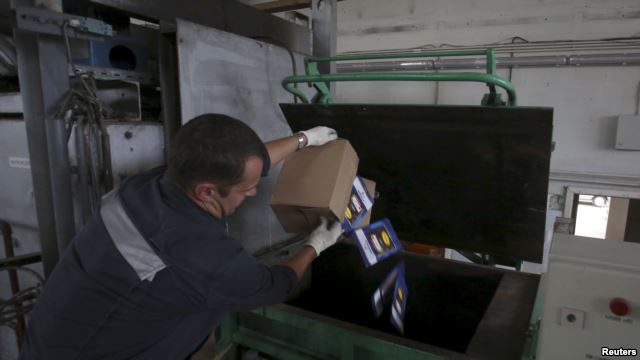VOA慢速英语:俄罗斯摧毁被禁止西方食物
- 参考译文
- 听力原文
The government in Russiais moving forward with efforts to destroy food imports from Western countries. The government banned the imports because of the dispute between Russia and the West over Ukraine.
俄罗斯政府正在努力进一步摧毁从西方国家进口的食物。由于俄罗斯与西方之间关于乌克兰的争端,政府明令禁止进口。
But a growing number of Russians say they find the banin bad taste.
但越来越多的俄罗斯人表示,他们发现这一禁令是庸俗的。
 |
|
An employee burns meat at a customs house at Pulkovo Airport in St. Petersburg, Russia, August 6. |
That is the sound of heavy earth-moving equipment running over Western cheese. Other Russian workers are burning boxes of frozen bacon. And state media reporters are cheering on the process.
这是重型推土设备碾过西方奶酪时发出的声音,其他俄罗斯工作人员正在烧毁成箱冷冻的培根。并且,这一过程中,官方媒体记者都在欢呼。
All this comes after President Vladimir Putin signed an order to destroy all Western foods that enter Russiain violation of existing sanctions.
所有这些都发生在总统普京签署一项法令之后,所有进入俄罗斯的西方食物都违反现有的制裁,必须摧毁。
Government officials say 350 tons of banned foods have been destroyed since the program went into effect earlier this month. There are plans to destroy even more. Russia's agriculture ministry has even requested a traveling "food crematoria" to speed up the work. Those machines would turn the food into ashes.
政府官员表示,本月初,自该项法令生效后,350吨被禁止的食物都已被摧毁。他们计划甚至摧毁更多。俄罗斯农业部已要求进行一次“食品火葬场”行动以加快工作。这些机器将使食物化为灰烬。
Such moves have led some to make fun of the program – and to a fair share of jokes among Russians on social media. But still others are criticizing the government's decision as insensitive. They say several generations of Russians can remember periods of hunger and food shortages.
这些举动使得一些人嘲笑该法令——成为俄罗斯社会媒体之间共享的笑话。但还有一些人批评政府的决定是麻木不仁的。他们表示,几代俄罗斯人都会铭记这饥饿、食物短缺的时期。
In St. Petersburg last week, Karina Hestanova joined a group of demonstrators protesting the food destruction law. She and others noted that many older adults in what was then the city of Leningrad starved to death during World War II.
上周,在圣彼得堡,Karina Hestanova 加入到示威群体中,抗议食品摧毁法令。她与其他人提到二战期间,在列宁格勒城市,许多老人被饿死。
To this day, she says, no one throws away food on thetable. It's offensive what they're doing, she adds.
时至今日,她说,没有人会扔掉饭桌上的食物。他们所做的事情太无礼了。她补充道。
An online campaign calling on government officials to overturn the decision has already gained over 300,000 supporters. When reached by Skype, the organizer – Olga Savelieva - says all she is asking is for banned goods to be donated to those in need.
网上发起一项活动,呼吁政府官员推翻该决定,已获得超过30万名支持者。当上传到Skype上,其组织者Olga Savelieva表示她所要求的就是将明令禁止的食物捐赠给那些需要的人。
"Payments to retired workers are small...and prices have gone up...even on food made here in Russia," she says.
“支付给退休工人的工资很少。。。并且物价也是水涨船高。。。甚至是俄罗斯生产食品。”她说。
President Putin's spokesman said the government may be open to some compromise. While the food destruction program will continue for now, the government plans to discuss Ms. Savelieva's campaign when it meets this week.
普京总统的发言人表示,政府可能会做出一些妥协。就目前而言,食品摧毁法令仍将继续。本周开会时,政府预计将讨论Savelieva女士发起的活动。
Charles Mayne in Moscow reported on this story for VOANews.com. George Grow adapted his report for Learning English. Kelly Jean Kelly was the editor.
_____________________________________________________________
Words in This Story
in bad taste– n. offensive or inappropriate
cheese– n. a food that is made from milk
bacon– n. thin pieces of salted and smoked meat, usually from a pig
sanctions– n. economic or financial restrictions
crematoria – n. places where dead bodies are cremated or destroyed
insensitive – adj. not responding to or caring about problems, changes or needs
table– n. an object that has a flat top and usually four legs
The government in Russia is moving forward with efforts to destroy food imports from Western countries. The government banned the imports because of the dispute between Russia and the West over Ukraine.
But a growing number of Russians say they find the banin bad taste.
That is the sound of heavy earth-moving equipment running over Western cheese. Other Russian workers are burning boxes of frozen bacon. And state media reporters are cheering on the process.
All this comes after President Vladimir Putin signed an order to destroy all Western foods that enter Russia in violation of existing sanctions.
Government officials say 350 tons of banned foods have been destroyed since the program went into effect earlier this month. There are plans to destroy even more. Russia's agriculture ministry has even requested a traveling "food crematoria" to speed up the work. Those machines would turn the food into ashes.
Such moves have led some to make fun of the program – and to a fair share of jokes among Russians on social media. But still others are criticizing the government's decision as insensitive. They say several generations of Russians can remember periods of hunger and food shortages.
In St. Petersburg last week, Karina Hestanova joined a group of demonstrators protesting the food destruction law. She and others noted that many older adults in what was then the city of Leningrad starved to death during World War II.
To this day, she says, no one throws away food on thetable. It's offensive what they're doing, she adds.
An online campaign calling on government officials to overturn the decision has already gained over 300,000 supporters. When reached by Skype, the organizer – Olga Savelieva - says all she is asking is for banned goods to be donated to those in need.
"Payments to retired workers are small...and prices have gone up...even on food made here in Russia," she says.
President Putin's spokesman said the government may be open to some compromise. While the food destruction program will continue for now, the government plans to discuss Ms. Savelieva's campaign when it meets this week.
Charles Mayne in Moscow reported on this story for VOANews.com. George Grow adapted his report for Learning English. Kelly Jean Kelly was the editor.
_____________________________________________________________
Words in This Story
in bad taste– n. offensive or inappropriate
cheese– n. a food that is made from milk
bacon– n. thin pieces of salted and smoked meat, usually from a pig
sanctions– n. economic or financial restrictions
crematoria – n. places where dead bodies are cremated or destroyed
insensitive – adj. not responding to or caring about problems, changes or needs
table– n. an object that has a flat top and usually four legs
- 频道推荐
- |
- 全站推荐
- 推荐下载
- 网站推荐




















